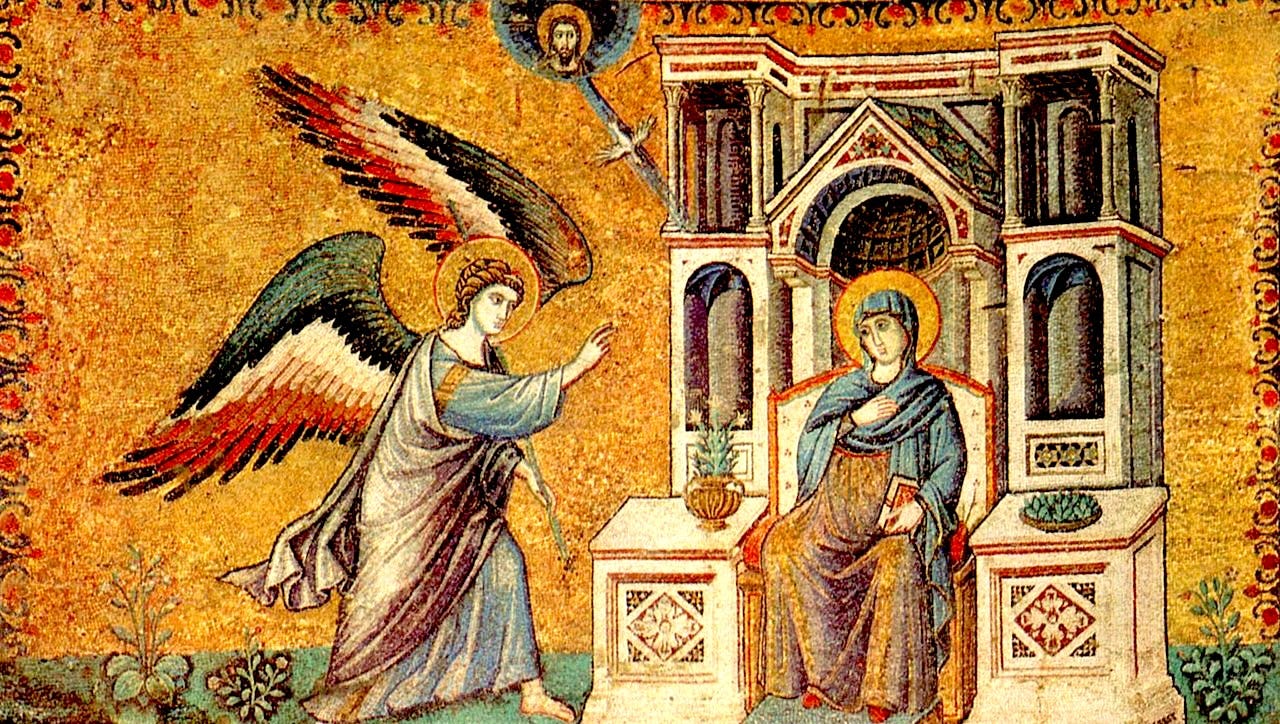The first 'Hail Mary' and Our Lady's reaction
Catholics say maybe 50 or more 'Hail Marys' a day—but how and why did Our Lady react in the way that she did when she first heard it?

Many feasts of Our Lady consist feature St Luke’s account of the Annunciation as the Gospel reading of the Mass.
It seems very probable (if not certain) that St Luke received this account from Our Lady herself.
In this chapter, dealing with the first part of the Annunciation, Fr Coleridge discusses…
When the Annunciation happened
What the devil knew about Our Lady—and what he didn’t know
How to understand Our Lady’s reaction to St Gabriel’s message.
See also:
Mary at the Annunciation
From
The Mother of the King—Mary During the Life of Our Lord
Fr Henry James Coleridge, 1886, Bk II, Chapter II, pp 81-88
St. Luke i, 26-38.
Headings added from contents page. Some line-breaks added.
Soon after the marriage—the Perfection of Mary
Within a few weeks of the arrival of St. Joseph and our Blessed Lady at their future home at Nazareth, we must probably place the great central mystery of the Annunciation.
It is needless to say that it would require a long series of treatises to unfold, even briefly, the various points of Christian doctrine which are involved in or dependent on the mystery of the Incarnation. Any attempt of such a kind would be beyond the scope of this work.
It is enough for us if we can give ourselves some at least general idea of the graces and elevations implied in the part committed to our Blessed Lady in the execution of that great work of God, a part which constitutes the foundation of her singular and unparalleled position in His Kingdom. We must let these prerogatives of this Blessed Mother unfold themselves gradually before us, without pausing to give anything that might pass for a complete catalogue of them.
The Annunciation, as it concerns our Blessed Lady, presents her to us in a twofold light for consideration. In the first place, it shows us very clearly, though incidentally, the great height and perfection of holiness which she must have already attained.
Her whole conduct and demeanour, her manner of meeting the singular and unprecedented circumstances in which she found herself, her silence as well as her speech, the words she said and what she did not say, her question as well as her answer, her hesitation as well as her joyful acquiescence, and her conduct as soon as the Incarnation had actually taken place, all these reveal her to us as an example of the highest and most absolute perfection in the various virtues which were successively called into play by the exigencies of the moment.
It adds to this view of her most beautiful virtues to remember that the Annunciation must have come upon her with all the shock of absolute suddenness, and yet it found her most perfectly prepared.
It was the most wonderful message that ever fell on human ear, and yet it did not put too great a strain on the depth of her Divine tranquillity. It demanded the most stupendous faith in the simple word of the messenger of God, and yet there was not the slightest breath of doubt on the spotless mirror of her assent. It tried her humility as much as her faith, it tasked her fortitude as well as her love for purity, it reversed all her plans and designs for the future, and set before her, a heart bent on self-abasement, the loftiest position that any creature of God could occupy.
But neither the will nor the mind of Mary staggered or wavered a hair's breadth from perfect conformity to the will or the arrangements of God. Nor were hers the silence and prostration of simple bewilderment. She could pause to consider what sort of a salutation that might be. When the moment came she could put calmly her most pertinent question as to the manner in which the mystery was to be carried out. From the beginning to the end of the dialogue, Mary is as much mistress of herself as the blessed Angel is master of himself.
Her great graces and dignity
The Annunciation also presents our Blessed Lady to us in another point of view, inasmuch as it is the central mystery of her life, the foundation of all her graces and all her dignity. It is this mystery which accounts for and is the Divine foundation of all the great privileges which theologians attribute to her. Not that many of these did not precede the Incarnation itself in point of time, but that this is the point and purpose of her Divine selection in which all other gifts whatsoever she received are included.
All the praises and prerogatives which the saints have attributed to her are sufficiently explained when we remember her elevation in this mystery. Thus we find that the theologians who have set themselves to give an account of her greatness, frequently select this point in her life as the occasion on which to treat of them altogether. Their discussions take the form of a commentary on the Gospel of the Annunciation. Some have even said that she now received so much grace that she could not receive more.
But in any case it is enough for us to remember that we have now before us the point in her life in which we may expect to find her advances in grace especially wonderful, and endeavour before we pass further to give to ourselves some account of the various privileges of which the saints speak. It is at all events certain that in this mystery she receives the highest perfection of her purity and closeness to God, as St. Ambrose tells us, the consummation of her Virginity and the fulness of her Maternity.
This is the fountainhead of all her other graces, whether, in point of time, they came to her before this or after this. The Annunciation thus looks backwards and forwards, to all that God had hitherto done for her and all that He was afterwards to do, nor is there any grace or glory or power that she has ever received that is not wrapped up in this.
Satan blinded to her greatness
These considerations must guide us in the thoughts which are to occupy us in the present chapter. Mary is now a wife, dwelling with her husband in the retired spot chosen from all ages by God for the scene of the Incarnation, the little house, as we believe, which is now the centre of so much loving devotion in the basilica of Loreto.
The eyes of the world see in her nothing more than in any other humble and pure soul, devoted to her duties and to prayer, most sweet and gentle in her converse, gracious and affable, humble and obedient. In the eyes also of the enemies of God, she was no more than others. At least Satan and his host were blinded by her extreme humility, and they had no thought that she might be the woman promised of old, between whom and him God was to set perpetual enmities.
For the evil spirits are not allowed always to use all their natural powers, either in prying into the secrets of souls and into the plans and ways of God, or in disturbing and annoying His servants. Though Satan may have been cunning enough to see something remarkable about Our Lady in the Temple, he may have been lulled in a false security by seeing her married like any other maiden.
If he had set himself now to watch carefully her proceedings, he might not have been permitted to be aware of the dialogue between her and St. Gabriel, or if he was not entirely prevented from knowing what was passing, he might have been disabled by his extreme pride and arrogance from understanding it.
The Salutation of Gabriel
Mary then was praying in her chamber, perhaps, as some of the saints tell us, pouring out special and most earnest supplications for the advent of the Messias, when the great light shone around her, and she heard the voice and saw the form of the Angel.
"Hail, full of grace! The Lord is with thee, blessed art thou amongst women!"
The salutation included three things.
First, she was addressed as full of grace, then she was told that God was with her. According to the usage of Scripture, this would mean that God was with her for some peculiar and special purpose.
In the third place, she was hailed as blessed among women. This last sentence, as it were, qualified the sentence preceding, that is, it explained, in the language of Scripture, the purpose for which God was with her in this new and special manner.
He was with her for some design, and to confer some particular grace, which was connected with the truth that she was blessed among women. Thus, the two last portions of the salutation carried the thoughts of our Blessed Lady back to the Scriptures with which she was so familiar, and these would furnish her mind with the considerations on which she began to ponder in order to discover what kind of message or salutation this might be.
Now, the last words of the Angel were taken textually from the Song of Debbora, and are used there of Jael,1 the instrument used by God for the destruction of Sisera, the captain of the host of the enemies of the holy people. As applied to Jael, they formed part of the long series of types and prophecies concerning our Blessed Lady herself which had begun with the first promise made in Paradise, and thus they would call to her memory the whole Divine order of prediction concerning the Messias and His Mother.
Thus, in the beginning of this dialogue, Mary is reminded of the wonderful graces which she had received from God, and of which she could not but be conscious. Then the Angel suggests to her that God is now with her for some further and particular purpose, and then this purpose is connected with the execution of some part of the great design of the Incarnation.
Shock to her humility
This is the simplest and shortest account of the contents of the salutation of the Angel, and it enables us to see the effect which it must have tended to produce in the soul of that blessed among women to whom it was addressed.
It would certainly touch her humility to the quick, not by any sudden uncontrollable shock, but, as seems most probable, by the deliberate choice of her will,2 as was the case with our Lord Himself, when it is recorded of Him that He was troubled or angry or sorrowful, and the like, when it is meant that He thought fit to call up such emotions in His soul and allow them to work naturally.
Not that our Blessed Lady had the same inherent and perfect dominion over these feelings as our Lord, Who could not have been without it, but that having perfect freedom from original sin by special favour from Him, she may have also had by participation that perfect control over herself which He had by natural right. For that our feelings are not perfectly and easily ruled by the will is a part of the weakness brought upon us by original sin.
If this be so in the case before us, then she chose to feel this kind of alarm and trouble on the score of her humility, as well as the awe, reverence, wonder, and amazement which so magnificent a message might naturally produce, or as some think, she might have felt it prudent to consider whether this great salutation might not contain in it something of illusion. For we know already that she was well practised in the warfare of the saints of God, who are continually assailed by all the cunning inventions of the enemy.
Her prudence
The next virtue which is displayed by our Lady on this occasion is her exquisite prudence, which made her keep silence and refrain awhile, thinking within herself, as the Gospel says, what kind of salutation this might be.
Instead of leaping forward to grasp the great honour which was implied in such a salutation from a messenger of God, she measured it by her humility, and perhaps also by her love of chastity, which she may have thought would be assailed in the event of her Maternity, and proceeded calmly and deliberately to weigh the whole matter in her mind.
Nor could the blessed Angel be indignant or be inclined to rebuke her, as he had had to rebuke St. Zachary, because it must have filled him with admiration and thankfulness to see God honoured by so much prudence and consideration, with which those helps and provisions for perfection in His service which are given to us in this valley of misery were so devoutly and faithfully used.
Further parts of this chapter will be published this week.
From Fr Henry James Coleridge’s The Mother of The King
If you’re enjoying reading Father Coleridge’s rich explanations of the Gospels and the life of Our Lord, then will you lend us a hand and hit subscribe?
Further Reading:
Follow our projects on Twitter, YouTube and Telegram:
Judges v. 24.
See Toletus, in Luc. c. i. ann. 74.





